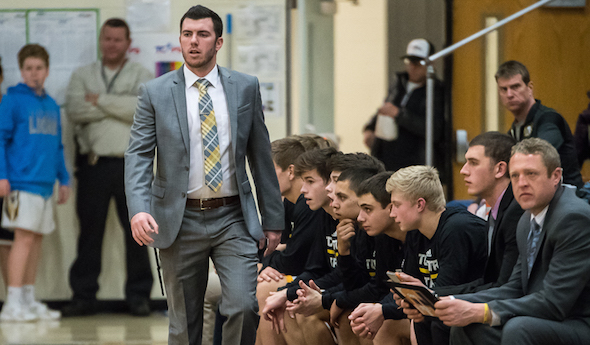
1st-Year Coach Brings Winning Experiences
January 18, 2018
By Dennis Chase
Special to Second Half
TRAVERSE CITY – Like dramatic finishes?
 Travis Schuba has experienced his share.
Travis Schuba has experienced his share.
As a junior in high school, Schuba dropped a buzzer-beating shot from the corner, as he was falling out of bounds, to give Kalkaska a stunning 48-47 Class C District basketball win over second-ranked Traverse City St. Francis in March of 2009. The Gladiators were 19-1 at the time.
That shot is one of the most memorable in Kalkaska history.
During the winter of 2011, as a sophomore at Madonna University, Schuba drained another fadeaway from the corner as time expired to upset NAIA-ranked Indiana Tech on the road.
That shot is one of the most pivotal in school history as it helped turn the struggling program’s fortunes around, leading to 63 wins over three years.
And then there was last Friday night.
That’s when Traverse City Central electrified its fan base as sophomore Henry Goldkuhle scored twice in the final 10 seconds to lift the Trojans to a wild 62-61 win over crosstown rival Traverse City West, giving the 26-year-old Schuba his first signature win as Central’s head coach.
“All (three) are memories I’ll never forget,” the first-year coach said. “But with this one (win over West) being in the present, it’s a little sweeter.”
What made it sweeter is that the Trojans showed resolve in battling back from a 13-point deficit.
“All the credit goes to the kids for not giving up and believing in what we do,” Schuba said. “I’ve been preaching all year to play for each other, to play within yourself, and if you do that good things will happen.”
The game was reminiscent of last year’s contest at Central when West opened a double-digit lead, only to see the Trojans whittle away at it. Central’s rally fell short a year ago, but not Friday.
“That’s the way it is in these types of emotional games,” said junior guard Tobin Schwannecke, who led all scorers with 27 points. “There’s always going to be ups and downs. There’s going to be crazy endings. We stayed with it. Coach stresses that, (battling) through tough times. We believed we were going to win. That’s what got it done for us.”
Just two months earlier, Schwannecke was experiencing similar feelings. The junior quarterback dashed 37 yards for a touchdown with under two minutes to play to boost Central to a 17-14 win over West in a Division 2 District football championship game.
Friday’s victory raised Central’s record to 7-3 at the halfway point of the regular season. A year ago, a young Trojans’ squad was 1-9 at this juncture before finishing strong to end 8-13.
The 7-3 mark includes a one-point loss to Gaylord and a two-point loss to Marquette, a game in which Central did not score in the first quarter.
“I know 7-3 sounds OK,” Schwannecke said. “But we know we should have a few more (wins). At the same time, maybe every team needs losses like that early in the year to motivate them and stress to not let it happen again, especially as we get late into the season when it really matters. So, 7-3, we’ll take it. But I’d much rather be 10-0 or 9-1, which I think we should be.”
Schuba would like a couple of those games back, too, but he’s pleased with how his players bounced back, especially after the 50-49 setback to Gaylord two weeks ago. Since, the Trojans have topped Rockford and West to put their season back on track.
The win over West came right before exam week and left the Trojans in an upbeat mood.
“It was an insane win,” senior Jordan Vicent said. “It should give us momentum for the rest of the season.”
It’s a season that’s been “a blur” thus far for Schuba, who accepted the job in August, replacing Jeff Turner, who moved downstate. Schuba has been going non-stop since.
“Once I took over, I was trying to get everything in line, get the boys in the gym, meet everybody, and then we had a great football season and (four) of my players were still playing football,” he said. “I didn’t see them until tryouts. Then a couple players, who would have played big minutes, quit. It was a whirlwind start.”
Actually, it was a whirlwind spring and summer, too.
After returning to Madonna last year to finish his degree in business administration, Schuba set out to land a head coaching job. He was a finalist at Gaylord. The Blue Devils ultimately promoted Justin Johnson, but athletic director Christian Wilson contacted Kingsley officials to put a good word in for Schuba about their open position.
One day after his June interview in Kingsley, Schuba was offered the job. He accepted and then withdrew his name for the Traverse City St. Francis vacancy.
This was it, the head coaching break the then 25-year-old was seeking. He began to implement his system in the summer.
“I had a summer with the team – just not the one I’m coaching now,” Schuba said. “A couple months later, I sit where I am now. It was a crazy turn of events.”
When the Central job opened, it was too inviting for Schuba to pass up.
“He told me it was his dream job,” Central athletic director Mark Mattson said.
Plus, it’s a job that does not come open often. Schuba was aware of that.
“Jeff was there 10 years,” he said. “I didn’t feel like this was an opportunity that would come about any time soon if I didn’t jump on it.”
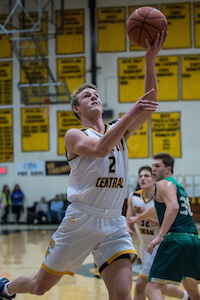 But would the fact that he was 25 and had limited coaching experience hinder his candidacy?
But would the fact that he was 25 and had limited coaching experience hinder his candidacy?
Schuba said he used his background as a positive. In addition to starring at Kalkaska and Madonna (first-team all-Wolverine-Hoosier Athletic Conference selection for two years), he played professionally, including two seasons with the Washington Generals, the team that traveled the world playing the Harlem Globetrotters.
“I have a background of playing, being around the game,” he said. “I let them know, ‘Yes I’m 25, but I’ve played more and seen more than most people.’ And at my age, nowadays, kids tend to relate better to people of a younger nature. So instead of saying I lack head coaching experience, I use (age) to relate to the boys and get them to buy in and trust me on a personal level to be able to get them to do what we need to do to be successful on the court. I think we have a great relationship. We joke off the court, but once we get to practice they know I mean business. I hope they’re having as much fun as I am. These relationships we’re building now will last a lifetime.”
Mattson said Schuba’s personality and drive won him over.
“I put my feelers out because I didn’t know him,” Mattson said. “I had heard positive things about him, that he was an up-and-coming coach, had been there as a player and had that experience coaching (as a student assistant last year) at Madonna.
“When we interviewed him, he had a confidence and maturity about him that we really liked. We liked what he had to offer, what he was about. We knew hiring a 25-year-old with no head coaching experience might be rolling the dice and taking a chance, but that’s what we did.”
And Central has not looked back.
“Besides the fact that he has the guys competing and we’re having success under his leadership, I’ve been really impressed with the way he’s set his standards for the program,” Mattson said. “He doesn’t waver from those. For a 26-year-old now, he gets it. He does a great job interacting with people. He’s focused. He’s driven. When he wants something done, needs something done, he gets after it.”
Mattson said he’s also been impressed with Schuba’s relationships with game officials.
“We’ve received compliments on the way he’s handled himself,” Mattson said. “He holds his staff and himself to high standards. That stuff can be teachable, but when he comes in with it and gets it right away that absolutely reflects positively on the kids, the program and the parents.”
Schuba was on the links, playing a round at the Grandview Golf Club in Kalkaska, when he received word from the district’s human resources office that he had been picked for the job.
“I actually missed the call and had to call back,” he said. “I was teeing off, so as soon as I got back to the cart I gave them a call. It made the rest of the round a little sweeter. I was able to play with more freedom. I wasn’t nervous thinking about it (anymore).”
Still, it was difficult to leave a job he had just accepted.
“I can’t say enough good things about Kingsley for the opportunity they gave me as a young coach without any head coaching experience, other than AAU, to trust me to run that program,” he said.
The Central players applauded the hire.
Vicent played AAU ball for Schuba last summer.
“We’ve been building off that relationship and it’s been going well,” he said. “I feel close to him, and I hope he feels close to me.”
Schwannecke did not play AAU ball with Schuba, but he knew about him.
“Obviously, he’s a pretty big name up here,” he said. “We loved Coach Turner, but after he left Coach Schuba was one of the first guys that came to mind that I would like to have coach us. He pushes us to be our best every day.”
Schuba, an administrative assistant at the high school, said the biggest realization he’s had coaching is that the same approach does not motivate every player.
“You have to realize these kids are 16 and 17,” he said. “Each one is different, and going through different things, so you find a way to coach them differently, but still learn the same things. You can’t yell at every kid the same. You can’t coddle every kid the same. You have to approach each differently and try to find what works and gets them to play at their highest level while still learning the game of basketball and learning life lessons.”
One person not surprised by Schuba’s success is his former college coach at Madonna, Noel Emenhiser.
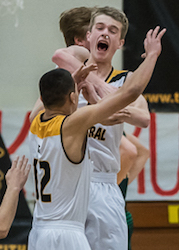 “Travis has always had an unbelievable understanding of the game,” he said. “That was one of his greatest strengths (as a player). You can look at the individual skills that he has – his shooting ability jumps out – but he really understood how the game was supposed to be played and what it took to be successful.
“Travis has always had an unbelievable understanding of the game,” he said. “That was one of his greatest strengths (as a player). You can look at the individual skills that he has – his shooting ability jumps out – but he really understood how the game was supposed to be played and what it took to be successful.
“He comes from a basketball family. His older brother (Chuck) was a successful college player and high school coach. He understood the game from the day he arrived here. He understood why things worked and why they didn’t. I thought it was a pretty natural fit to want to coach. In addition to understanding the game, Travis has an incredible confidence and that’s important in coaching because he knows what he needs to do, and he has the ability and belief in it to make sure that it happens. He doesn’t go home questioning whether he’s doing the right things. He knows he is, and he’s going to ensure the players believe in that and buy into the same things he does.
“If I were to guess, I would think the players really enjoy playing for him. I’m sure he’s tough and demanding, but at the same time I’m sure he really builds confidence into his players in the way that they understand what it takes (to succeed) and they know they can do it.”
That connection between Schuba and his players was evident on the gym floor following Central’s win over West.
“It was a sea of people, and everyone was excited,” Mattson said. “I was about five feet away as I watched one of our players try to find (Schuba). He was seeking him out to give him a great big bear hug. And when he did, Travis had a huge smile on his face. It was something special as an athletic director to observe this from a distance. That’s what it’s about right there.”
It was another memory-maker for the young coach.
And as for that shot that took down St. Francis in the 2009 high school tournament, that one is hard to forget, too.
His brother, Chuck, who is 11 years older, was the Kalkaska coach at the time.
“I give that one to my brother,” Travis Schuba said. “He did his studies. We threw in a bunch of defensive sets, mixed it the whole game, and slowed them down.”
Ironically, Schuba was supposed to be the decoy on the game-winning play, but he ended up with the ball. The rest is history.
“I still have people ask me, ‘Do you remember that shot?’” he said. “Of course, I remember that shot. It was one of the coolest moments of my career.”
The game-winner for Madonna registers, too. The Crusaders had won eight games in Schuba’s freshman season – Emenhiser’s second at the helm. They had started the 2011-12 season 0-4 when Schuba hit the shot to upset Indiana Tech.
“There were two seconds left on the clock,” Emenhiser recalled. “We ran him off a screen. He went flying into the corner, caught the ball and shot it all in one motion – nothing but the bottoms. That propelled us. We won our next nine games. It was the beginning of that (63-win) run we had for three years. Before (Schuba’s class arrived), we had one winning season in program history. We were still trying to build a culture and change who we were. We had played some good games, but the guys didn’t yet believe we could be a great team. That shot really gave the guys a ton of confidence. It was a pivotal moment in our program.”
Madonna later went on to a win a conference tournament title and play in the NAIA national tournament.
Schuba, who still holds the Madonna career records for 3-pointers made (399) and 3-point accuracy (better than 40 percent), wants his Central players to embrace success as well.
And it seems to be working.
“Coach Schuba does a great job instilling in us that we should expect to win,” Schwannecke said.
So far, so good.
 Dennis Chase worked 32 years as a sportswriter at the Traverse City Record-Eagle, including as sports editor from 2000-14. He can be reached at [email protected] with story ideas for Manistee, Wexford, Missaukee, Roscommon, Ogemaw, Iosco, Alcona, Oscoda, Crawford, Kalkaska, Grand Traverse, Benzie, Leelanau, Antrim, Otsego, Montmorency, Alpena, Presque Isle, Cheboygan, Charlevoix and Emmet counties.
Dennis Chase worked 32 years as a sportswriter at the Traverse City Record-Eagle, including as sports editor from 2000-14. He can be reached at [email protected] with story ideas for Manistee, Wexford, Missaukee, Roscommon, Ogemaw, Iosco, Alcona, Oscoda, Crawford, Kalkaska, Grand Traverse, Benzie, Leelanau, Antrim, Otsego, Montmorency, Alpena, Presque Isle, Cheboygan, Charlevoix and Emmet counties.
PHOTOS: (Top) Traverse City Central coach Travis Schuba watches his team work during its game against Grand Rapids Forest Hills Central this season. (Middle) Traverse City Central's Tobin Schwannecke gets to the basket a week ago against Traverse City West. (Below) Central players celebrate their win over the Titans. (Photos by Rick Sack/TC Rick Photo.)
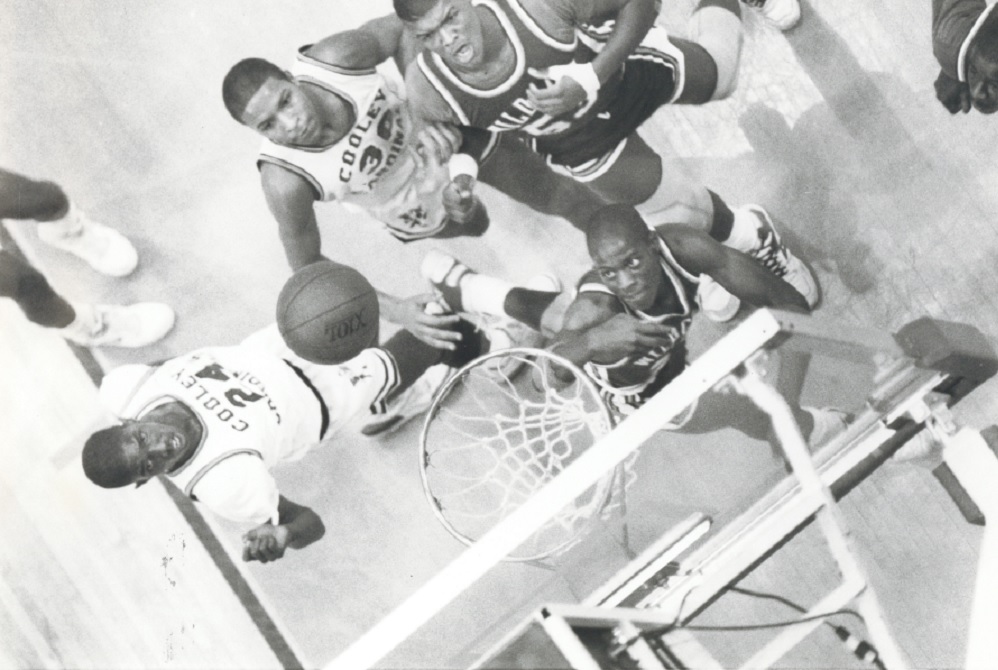
1970-1995: Detroit, Flint Ruled Class A Boys Basketball
By
Ron Pesch
MHSAA historian
March 7, 2022
Geographic domination.
It really hasn’t happened on the basketball court in the MHSAA’s top classification since the mid-1990s.
Class A state titles – designated Division 1 in basketball since 2019 – have bounced around Michigan over the last 25-plus years like, well, an over-inflated wayward basketball. Kalamazoo Central, Pontiac Northern, and Clarkston grabbed back-to-back titles between 1996 and 2021. The Saginaw area locked down five Class A crowns within that stretch; Arthur Hill snagged one in 2006, while Saginaw High immediately followed with two in a row in 2007 and 2008. The Trojans also won in 1996 and 2012. Greater Lansing has three titles – one by Lansing Everett, another by Lansing Waverly, then one by Holt High School – about eight miles outside the city limits.
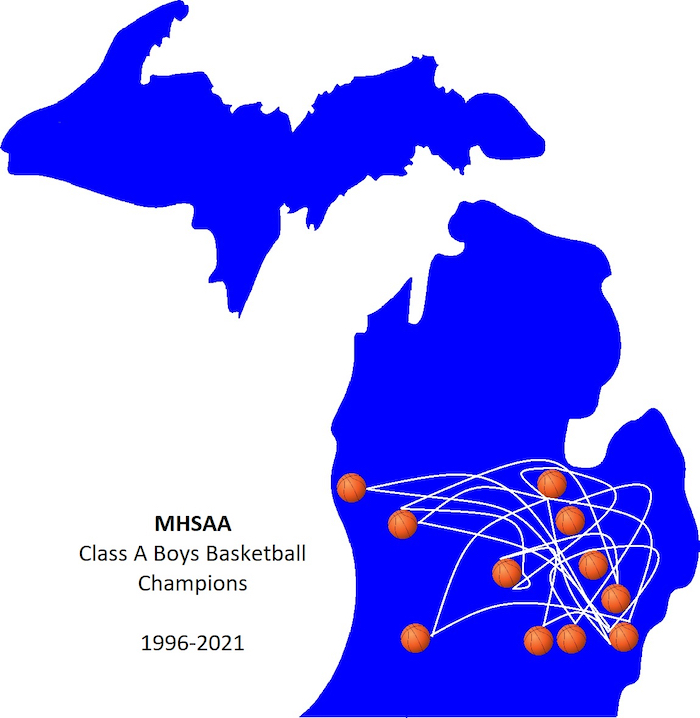 Then it’s single titles to Grand Rapids Ottawa Hills, Rockford, Muskegon, Ann Arbor Pioneer, and Ypsilanti Lincoln. Metro Detroit schools Romulus, Pershing, Central, Western, and U-D Jesuit also have single championships during that span.
Then it’s single titles to Grand Rapids Ottawa Hills, Rockford, Muskegon, Ann Arbor Pioneer, and Ypsilanti Lincoln. Metro Detroit schools Romulus, Pershing, Central, Western, and U-D Jesuit also have single championships during that span.
But from 1970 to 1995, a trip to the Finals to watch the ‘A’ title game meant – with rare exception – you were watching a team from Flint or Greater Detroit. Or both.
Flint: Home of the Vikings
Opened in the fall of 1928, Flint Northern had been the Vehicle City’s top basketball school, winning Class A titles in 1933, 1936, 1939, and 1940 under coach Jim Barclay, then another in 1947 under Les Ehrbright. The Vikings also advanced to the state championship game in 1954 under Carl Stelter, losing to Muskegon Heights in overtime, 43-41.
Then, things went mostly quiet for the next decade and a half.
Jack Marlette was only the fourth varsity basketball coach in school history. Since arriving at Northern in 1949, he had served as head coach in tennis and golf, sophomore coach in basketball and football, junior varsity coach in basketball and football, equipment manager, and head trainer.
Midseason 1955, he replaced Stelter as the varsity basketball coach, when Stelter was named a principal within the Flint school district.
“Marlette coached teams posted a record of 112 victories and 99 defeats,” stated Len Hoyes in the Flint Journal when the coach stepped down in March 1967. “Included are six city championships, two districts, and a Saginaw Valley Conference crown in 1956.” His 1957 team reached the MHSAA Quarterfinals, losing to East Detroit.
With the announcement, Northern wooed 36-year-old Dick Dennis to take his spot come the 1967-68 season. Dennis’ teams had posted an impressive 105-21 varsity record at Alpena High School over seven seasons. Perhaps more impressively, his teams had beaten two of the Flint area’s finest in the MHSAA Regional round in 1966.
Dennis agreed to the move to Northern, “but had one important request,” stated reporter Bruce Johns in the Journal. “He wanted Bill Frieder as the junior varsity coach.”
Frieder, who would ultimately become a legendary basketball figure in Michigan, had landed his first basketball job as JV coach under Dennis at Alpena during the 1965-66 school year.
“… (A) son-in-law of Larry Laeding, former Saginaw High coach and a former player for the Trojans, Freiders (sic) had a 20-11 JV record for two years,” noted the Journal at the time of the hiring. (Laeding’s Saginaw team had won the Class A basketball championship in 1962.)
Dennis’ varsity squad posted an 11-6 record that first year, followed by a 13-6 mark in 1968-69, the program’s best season in 10 years. Frieder’s 1967-68 JV Vikings finished with a 13-3 mark, earning a share of the Saginaw Valley Conference’s title. In his second year, Frieder’s squad went a flawless 16-0.
But a teacher’s strike in Flint the following school year caused Frieder to resign from his position.
“At this point, I want to emphasize that I am highly opposed to teachers’ striking as I feel it sets a poor example for children and such an act reflects upon me personally,” stated Frieder in a letter of resignation to the Flint Board of Education.
Unable to work around it, he stepped aside.
Another shake-up
After three seasons at the helm, in May 1970, Dennis accepted an assistant principal position within the district. Northern administration interviewed nine “capable” candidates for the opening, including the former JV coach.
“Out of the candidates, we felt that Bill was the best qualified,” Northern athletic director Jim Fowler told the Journal’s Dean Howe 22 days later. “Bill is familiar with our situation at Northern, he’s familiar with the kids and unquestionably a fine coach.
“… it was Dennis’s strong recommendation that finally swung the gavel Frieder’s way,” stated Howe.
“Bill has a tremendous ability to get along with the kids,” Dennis had told the Journal in 1969. “… there are some coaches who never accomplish this. Bill’s two outstanding characteristics are his loyalty to the job and kids and his tremendous amount of pride.
“He just loves the game. Bill works just as hard at developing good citizens as he does to winning.”
Under Frieder, the Vikings quickly returned to the state spotlight, winning two straight MHSAA Class A championships in 1971 and 1972.
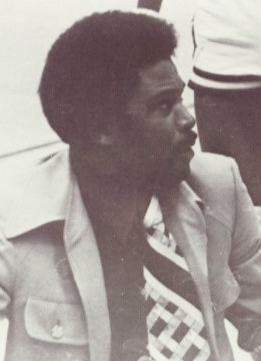 For the first time since 1954, Northern enjoyed final round success. Frieder’s 1971 Vikings, powered by senior Tom McGill and the Britt brothers, Wayman and James, clipped the taller – and favored – crew from Detroit Kettering, led by Lindsay Hairston, 79-78.
For the first time since 1954, Northern enjoyed final round success. Frieder’s 1971 Vikings, powered by senior Tom McGill and the Britt brothers, Wayman and James, clipped the taller – and favored – crew from Detroit Kettering, led by Lindsay Hairston, 79-78.
A year later, Frieder’s team beat Pontiac Central, a squad it had defeated twice during the regular season, 74-71. It was the Vikings’ 33rd-straight victory.
Frieder returned for the 1972-73 season. The Vikings posted an 18-7 record and won a District title. In July, his JV coach from the past two seasons, Grover Kirkland, was named head basketball coach at Flint Northwestern. In August, Frieder resigned. Rumors had been flying that he might go to the University of Michigan as an assistant. A Saginaw native, Frieder stated his “retiring is a result of many things.” Primarily, he planned to return to Saginaw to go into the produce business with his father.
The rumors, it turned out, were true. A little over a month later, the University of Michigan appointed Frieder as assistant basketball coach.
“We think it’s very fine to have a man of Bill’s caliber on our staff,” said Johnny Orr, Michigan’s head men’s basketball coach.
“If at this point in my life, I could describe the job I wanted most, the thing I wanted most to do in my life, this would fit it to a tee,” said Frieder at the time of the announcement.
Bill Troesken, 29, who had stepped down in June of 1973 after three years as varsity coach at Flint Powers Catholic, was hired by Northern to replace Frieder. His team would grab another Class A championship in March 1978.
A Long Drought
Flint’s oldest high school, Flint Central, was opened in 1875. Incredibly, the boys basketball team never won a state title – or even appeared in a championship game – until coach Stan Gooch arrived on the scene.
“Gooch, who starred in basketball at Flint Tech High, Flint Junior College, and Central Michigan (University), began his coaching career as bench boss of the sophomore team at Central High in 1959,” recalled Brendan Savage for MLive in 2008 at the time of his induction into the National High School Athletic Coaches Association Hall of Fame. “He took over the reins of the junior varsity the following year and was promoted to varsity coach in 1966.” Gooch guided Flint Central to its first state championship game in 1967, but Central was trounced by Detroit Pershing, a PSL squad considered by many to be the greatest basketball team in Michigan prep history. Guided by coach Will Robinson, the Doughboys were led on the court by future NBA players Spencer Haywood and Ralph Simpson.
Gooch resigned following the 1967-68 season to become head coach at Flint Junior College (which was converted into a countywide college, and rebranded as Genesee Community College in 1969, then renamed Mott Community College in 1973). After 10 seasons, Gooch stepped down, and within months, he replaced his replacement at Flint Central, Clif Turner, who had guided the program through the 1977-78 season.
Central then won three straight Class A titles from 1981-83, helping to build the legend of Flint basketball.
Then it was Northwestern’s turn. In both 1984 and 1985, Coach Kirkland’s Wildcats beat Detroit Southwestern. With those wins, the Flint city schools had now won six of the last eight titles.
“City of Champions defies explanation” trumpeted the Journal at the end of March 1985, after Northwestern had won Class A and Flint Beecher had won the boys title in Class B.
“No single factor can be pinpointed as the reason Flint has dominated,” wrote Phil Pierson under the headline, “while metropolitan Detroit, an area approximately 10 times larger, has failed to win a Class A Championship since 1979.”
Northwestern’s Glen Rice “became the area’s first recipient of the Mr. Basketball award presented by the Michigan High School Basketball Coaches Association and has been named to the Parade and Basketball Weekly All-American teams. (Beecher’s Roy Marble finished second, while Central’s Terence Greene finished fourth in Mr. Basketball balloting).
Was this success the opportunity to play year-round, asked Pierson. Coaching? The talent on the court?
Other areas across the state featured these same strengths, concluded the writer. “It may just be that the reason for Flint’s success is too obvious to be considered by the philosophers: the cyclical nature of high school sports.
“There was nothing wrong with Flint basketball from 1948-70 when there were no state Class A or B championships. Other teams and programs were just better.”
The Return of the PSL
It took five years after the return to the MHSAA Tournament before the PSL earned a Class A title with that ’67 Pershing squad. The next arrived in 1970, again by Pershing, then in 1973 by Southwestern, and again in 1979 by Mackenzie. Class A was won by Metro Detroit in 1974, by Birmingham Brother Rice, in 1975 by Highland Park, and in 1976 by Detroit Catholic Central.
From 1971 to 1985, Flint’s public school champions had defeated Pontiac Central twice, and PSL teams from Kettering, Murray-Wright, and, famously, Southwestern, on four straight occasions between 1982 and 1985.
On only two occasions between 1975 and 1995 did the Class A crown leave the city of Flint or Metro Detroit. In both instances, it landed in Lansing. In 1977, the Lansing Everett Vikings, led by Earvin Johnson – nicknamed “Magic” by the press – wrestled it away by downing Brother Rice in a 60-56 overtime thriller. In 1980, Lansing Eastern, powered by the state’s first Mr. Basketball winner, Sam Vincent, did the same, with a 64-53 victory over Highland Park.
The Cycle of Basketball
As soon as the ink dried on Pierson’s words, it seems, the cycle rotated.
Romulus took down Southwestern in ’86 before the PSL took control of Class A beginning with the 1987 season. Cooley, coached by Ben Kelso, snagged the first of three straight that year. After finishing as runner-up in seven of the previous eight title games, Southwestern, coached by Perry Watson, grabbed back-to-back victories in ’90 and ’91. Coach Johnny Goston’s Pershing teams beat Benton Harbor for consecutive titles in 1992 and 1993. Then Murray -Wright, coached by Robert Smith, captured its first crown in 1994.
On four of the eight occasions between 1987 and 1994, the Class A game featured an all-PSL card.
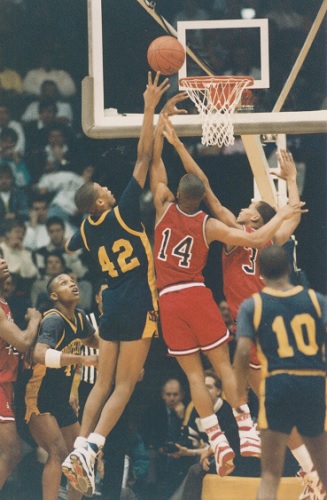 The 1995 Class A final wrapped the amazing run as No. 1-ranked Flint Northern, powered by Mateen Cleaves’ game-leading 28 points and Antonio Smith’s 24 points and 15 rebounds, decimated No. 2 Pershing, 86-64 before a crowd of 11,179 at the Breslin Center. Northern had trailed 44-37 at the half.
The 1995 Class A final wrapped the amazing run as No. 1-ranked Flint Northern, powered by Mateen Cleaves’ game-leading 28 points and Antonio Smith’s 24 points and 15 rebounds, decimated No. 2 Pershing, 86-64 before a crowd of 11,179 at the Breslin Center. Northern had trailed 44-37 at the half.
It was Northern’s first title since 1978. It would also be the program’s last. The introduction of “school of choice” in Michigan in 1996, combined with plunging birth rates in the U.S. that peaked in 1978, meant upheaval in enrollment across the state’s public schools. In Flint, declining enrollment – also impacted by the pending closure of a massive automotive manufacturing complex operated by General Motors known as “Buick City” – forced the closure of Central following the 2008-09 school year. Northern closed in 2013. Following the 2017-18 school year, Northwestern and Flint Southwestern merged, leaving Southwestern as the city’s lone high school.
In Detroit, Northern, Mackenzie, and Murray-Wright were among four high schools closed by the Detroit Public Schools in 2007 due to cost constraints and declining enrollments. Cooley was shuttered in 2010. Southwestern, dedicated in 1922, and Kettering, opened in 1965, both closed in 2012.
Of the 26 Class A title games waged between 1970 and 1995, Flint City Schools and the PSL teams each won nine of those contests. On 15 occasions, the championship game featured a match-up of Flint and Detroit PSL teams. On only seven occasions did schools from outside Wayne, Oakland, or Genesee counties ever crash the championship party. Saginaw High School ended with runner-up honors in 1973, 1976, and 1990, with Lansing and Benton Harbor High Schools being the only others.
Parade of Talent
Basketball junkies attending title games during those years watched an incredible collection of talent come out of those teams from Flint, the PSL and metropolitan Detroit during the span.
On the coaching side:
► Frieder ended up as head coach at Michigan with the 1980-81 season, then Arizona State in 1989.
► Gooch compiled over 400 varsity wins and 86 JV victories during his time at Flint Central.
► Kirkland ended his basketball coaching career in 2000 as Flint’s all-time winningest varsity coach, compiling a 518-148 mark. His Wildcats compiled 60-straight wins between January 1984 and February 1986 and presently rank No. 3 in consecutive wins in state history. In 2020, Detroit Free Press writer Mick McCabe named Northwestern’s 28-0 team from 1985 as the greatest boys basketball team he covered in his 50 years of reporting.
► Southwestern’s Watson served as an assistant at Michigan for two seasons, then guided the men’s basketball team at the University of Detroit Mercy from 1993 to 2008, compiling a 258-185 record over 15 seasons.
► Kelso, a Flint Southwestern graduate who did not play high school basketball but ended up as the all-time scorer at Central Michigan when he graduated in 1973, would be a finalist for the head coaching spot at CMU in 1997. At Cooley from 1984 through 1998, he later served as an assistant basketball coach at Kansas State in 2005-06.
► Kettering’s Charles Nichols, on hand since the school opened, coached tennis, football, and track during his first years at the school. With the 1970-71 season, he took over basketball coaching duties from Walt Jenkins, guiding the team for four campaigns. In December 1974, he joined Dick Vitale’s coaching staff at the University of Detroit for parts of two seasons. He returned to Kettering in 1978 as athletic director, then later served as assistant director of the PSL until his retirement in 2002.
The players included:
Flint
► Central’s Eric Turner, Marty Emery, Mark Harris, Keith Gray, Terence Green, and Darryl Johnson.
► Northern’s Terry Furlow, Dennis Johnson, Gary Pool, Antonio Smith, and Mateen Cleaves.
► Northwestern’s James Person, Jeff Grayer, Glen Rice, Andre Rison, Anthony Pendleton, and Daryl Miller.
Detroit PSL
► Cass Tech’s Tony Jamison and William Mayfield.
► Cooley’s Yamen Sanders, Earl Stark, Rafael Peterson, Michael Talley, and Daniel Lyton.
► Kettering’s Lindsay Hairston, Joe Johnson, Eric Money, and Coniel ‘Connie’ Norman.
► Mackenzie’s Steve Caldwell and Dave Traylor.
► Murray-Wright’s Willis Carter and Robert Traylor.
► Northern’s Katu Davis and Leonard Bush.
► Pershing’s Phil Paige, Robert Hawkins, Calvin Harper, Willie Mitchell, Carlos Williams, Todd Burgan, and Winfred Walton.
► Southwestern’s Darryl Robertson, Antoine Joubert, Clarence Jones, Sam Sillmon, Tarence Wheeler, Anderson Hunt, Loren Clyburn, James Hunter, Jalen Rose, Voshon Lenard, and Howard Eisley.
Metro Detroit
► Birmingham Brother Rice’s Will Franklin, Kevin Smith, and Tim Andree.
► Detroit Catholic Central’s Mike Prince and David Abel.
► Highland Park’s Terry Duerod, Percy Cooper, and Renardo Brown.
► Pontiac Central’s brothers Campy, Larry and Walker D. Russell; Larry Cole, Tim Marshall, and Clyde Corley.
► Romulus’s Terry Mills, and Stevie Glenn.
 Ron Pesch has taken an active role in researching the history of MHSAA events since 1985 and began writing for MHSAA Finals programs in 1986, adding additional features and "flashbacks" in 1992. He inherited the title of MHSAA historian from the late Dick Kishpaugh following the 1993-94 school year, and resides in Muskegon. Contact him at [email protected] with ideas for historical articles.
Ron Pesch has taken an active role in researching the history of MHSAA events since 1985 and began writing for MHSAA Finals programs in 1986, adding additional features and "flashbacks" in 1992. He inherited the title of MHSAA historian from the late Dick Kishpaugh following the 1993-94 school year, and resides in Muskegon. Contact him at [email protected] with ideas for historical articles.
PHOTOS (1) Detroit Cooley's Rafael Peterson (24) and Benson Maurice match up with Flint Northwestern's Archie Munerlyn (53) and Reggie Richardson during the 1988 Class A Final. (2) The Class A/Division 1 championship has been won by teams across the southern half of the Lower Peninsula over the last 25 years. (3) Grover Kirkland, here in 1975, built Flint Northwestern into a power. (4) Detroit Southwestern's Jalen Rose (42) and Cooley's Michael Talley (14) work to grab a loose ball during the 1989 Class A Final. (Photos courtesy of the Detroit News [1] and Gary Shook [4], or collected by Ron Pesch.)

